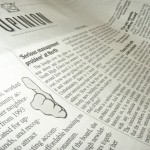
I am a proud member of Rotary International, an organization where service above self is its objective and whose efforts help millions of people locally as well as around the world. In fact, Rotary has been instrumental in helping to completely eradicate polio on this planet, an achievement that is very close to realization.
As a benefit of this membership, not only do I get to work with some great people, but I am exposed to the inspired writings of some famous and not-so-famous people. In the latest edition of the Rotarian magazine, I was provoked by an article by Joe Queenan entitled “I’m [not] Sorry.” In his writing, Joe takes us on a historical journey into the act of apologizing, and how what was once considered the morally correct thing to do, has in the U.S. morphed into something that has become “so rote, gutless, emaciated, tortuous, insincere, and self-aggrandizing” as to make it worthless to the victim. Historically, begging for forgiveness was not just a saying; it was what was expected by the person apologizing, that there be some groveling involved. Today, politicians go so far as to make it our fault with the apology that goes something like, “I regret that the actions I am accused of having committed caused any undo pain and/or suffering.” In other words, “It’s too bad that you’re so thin-skinned as to have taken offense, get over it.”
Never doubt that I won’t try to put a marketing spin on this, it’s what I do.
This article got me thinking. How many companies, in an effort to protect their brand, fail so miserably when after the inevitable mistake, they simply do not thoroughly apologize to their customer? Many companies will make the attempt by offering money back, or the exchange for a new product, or even the coupon that allows you to come back for free. And, don’t get me wrong, these are all good moves in the right direction. But what effect would it have if the CEO were to write a personal letter of apology, begging that the customer stay as a customer? Would this amount of “groveling” have any added effect? How would this action make you feel?
In one of his latest blogs, a good friend and confidant, Shawn Kincaid, writes about Finding your Mission and Core Values as a prerequisite to setting your business apart from the competition. It’s a great article and one that will make you think. I recommend spending time with it.
My take on this is that if your core values include the priority of valuing the relationship you have with your customer then it must necessarily include the importance of admitting your mistakes and begging for forgiveness. And I’m really not saying that the customer is always right, there are indeed times where the customer is just plain wrong. But when your mistake happens, and you know it will, then having a formalized public relations policy for saying “I’m Sorry,” can go a long way towards improving that all important customer relationship.
I’d love to hear your thoughts.
Regards,
David
